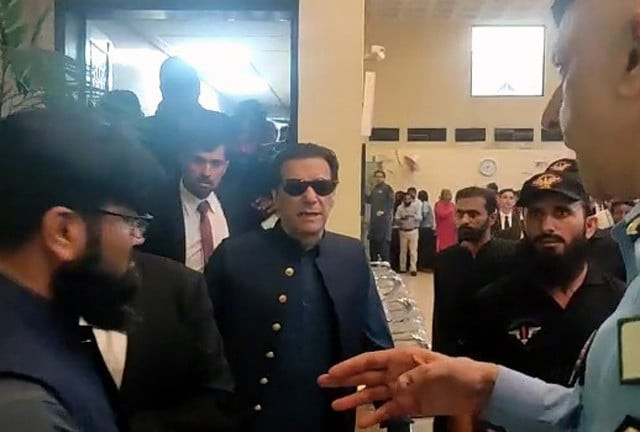Imran moves SC against 'undeclared martial law'
Urges top court to take notice of 'unconstitutional' measures in 3 provinces and Islamabad

Pakistan Tehreek-e-Insaf (PTI) chief Imran Khan has urged the Supreme Court to take notice of what he describes as an "undeclared martial law" imposed in parts of the country.
In a compelling 49-page petition filed with the top court through his lawyer, Hamid Khan, the PTI chief has highlighted the ongoing crackdown against his party, which now faces an existential threat.
In his petition, Imran brings attention to the invocation of “the aid of the armed forces in the Federal Capital Territory, Punjab, Balochistan, and Khyber-Pakhtunkhwa (K-P) under Article 245 of the Constitution.”
He argues that the exercise of this power by the federal government, without objective conditions warranting its use, infringes upon fundamental rights and is therefore a clear violation.
Imran also pleaded the SC to appoint a commission led by an SC judge to probe into the events surrounding his arrest on May 9 and subsequent incidents.
Imran was arrested from the premises of the Islamabad High Court (IHC) during a whirlwind raid, a development that sparked angry protests with rioters vandalizing and setting fire to state property as well as army installations and memorials.
The coalition government later launched a massive crackdown against the PTI, rounding up thousands of people allegedly involved in rioting while also registering criminal cases against the party leaders.
The civil and military leaders on May 17 also endorsed a decision made a day earlier during a meeting of corps commanders to invoke the Pakistan Army Act, 1952 and the Official Secrets Act, 1923 against people involved in the May 9 riots.
Read Government adamant on cornering Imran Khan
As the crackdown intensified, dozens of PTI leaders—including close confidants of Imran Khan—started jumping ship in what was described by the PTI chief as “forced divorces.”
Now cases against 16 “miscreants” are scheduled to be heard by the military courts.
In the petition, Imran raised several questions not only about the nature of his arrest—which the SC declared unlawful on May 11—but also about the invocation of the Pakistan Army Act, 1952 and the Official Secrets Act, 1923 against civilian offenders.
It questioned: "Whether the trial of civilian saboteurs who allegedly were involved in attacks on [Lahore] Corps Commander's House—which is originally Jinnah House and a civilian house for legal purposes—is without jurisdiction, coram non judice and malafide".
Furthermore, "whether the trial of civil offences committed by civilians under the Army Act is against the provisions of Article 4,9, 10 A, 14 and 25 of the Constitution read with UN Charter of Human Rights and other international charters".
The petition argued that trying civilians in military courts would be synonymous with denying them the right to life, due process and fair trial, the dignity of man and equal protection of law to the accused.
It also contended that the "deliberate, mala fide, contumacious disregard" for the judgments passed by the SC concerning the provision of elections ought to be determined judicially.
The apex court on April 4 ordered the Election Commission of Pakistan (ECP) to hold polls in Punjab on May 14. However, the parliament rebuked the SC while also rejecting a government bill seeking funds for holding polls in Punjab and Khyber-Pakhtunkhwa provinces.
The PTI chief also pleaded with the apex court to take notice of the "unlawful arrests" of the party leaders and others accused of vandalizing state installations "without the registration of cases under the applicable laws".
"The arrests, investigation and trial of civilians in peace-time under the [Pakistan] Army Act, 1952 read with the Official Secrets Act, 1923 [are] unconstitutional and void, of no legal effect and amounts to the negation of the Constitution, rule of law and independence of the judiciary," the petition stated.
Furthermore, it described the arrests and detentions of the PTI party members, supporters and workers under the Maintenance of Public Order provisions as unconstitutional.
"The dismantling of the PTI through [forced] quitting of party membership and office," it argued, "are unconstitutional and void of being against Article 17 of the Constitution".
Though the PTI was successful in the first round of its confrontation with the government as party chief Imran Khan was released from the custody of the National Accountability Bureau (NAB) with the support of the superior judiciary on May 11.
However, now there is a debate as to who will prevail in the second round of this confrontation as a massive crackdown is underway against the party leadership and workers for instigating and carrying out attacks on state properties and military installations in the wake of Imran’s arrest on May 9.
Once again, all eyes remain on the apex court as the PTI's political future hangs in the balance.



















COMMENTS
Comments are moderated and generally will be posted if they are on-topic and not abusive.
For more information, please see our Comments FAQ